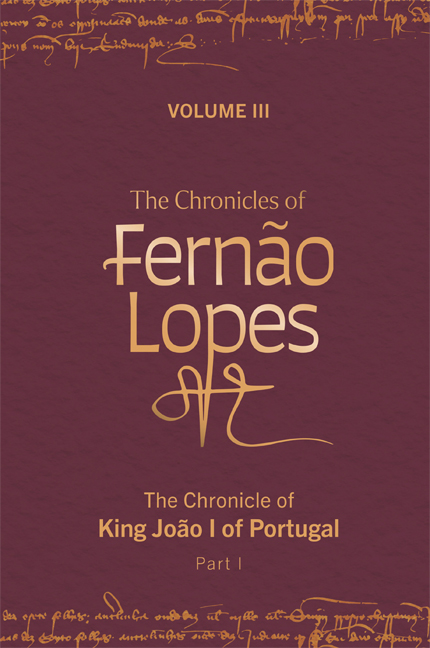Chapter 69 - How the ships bearing fish from Galicia were captured
Published online by Cambridge University Press: 28 December 2023
Summary
Just when this new war broke out among the Portuguese, not to mention the one they waged against the Castilians, and while the Master was in Lisbon, as we said, on a certain Monday morning, the first day of February 1384, there appeared at the mouth of the Tagus a galley from Castile, five balingers and a large nao. As the weather was inclement, the merchant vessels anchored downstream from Restelo, at more than a league away from the city. The nao and the galley remained further downstream, between Oeiras and Santa Catarina, a good distance away from the balingers.
The Master was informed that some of these ships were from Galicia, laden with flour and other provisions, and had come to meet the Castilian fleet, as they believed it was already besieging the city. Other ships were laden with dried fish for Aragon. Having made certain that all these vessels belonged to his enemies, the Master immediately ordered two galleys, two naos and three barges to be prepared. After two days they were at the ready and equipped with weaponry and ship's company.
Having come to anchor, these ships did not think they would undergo any harm from the people in the city, believing that they would be so preoccupied with preparing for the expected siege that this would give them plenty to think about and leave them no opportunity to take note of anything else. What happened was that before dawn the Portuguese naos and barges launched an attack on these ships. The Castilian galley, on seeing the Portuguese galleys and other sailing ships approaching, abandoned its anchors, took to flight and got away; the smaller vessels were all captured and brought to port in the city, without putting up any further resistance, which would have been pointless.
The new and mighty nao of 200 tonéis had been well fitted out by a Jew named Don David from La Coruña. Realising what was happening, she hastily unfurled her sails, though the weather was unfavourable. She tried to find a way out taking advantage of the current opposite the fortress and sailed against the headwind as best she could.
- Type
- Chapter
- Information
- The Chronicles of Fernão LopesVolume 3. The Chronicle of King João I of Portugal, Part I, pp. 137 - 138Publisher: Boydell & BrewerPrint publication year: 2023



